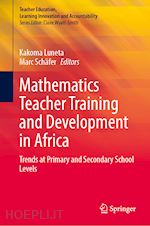
Questo prodotto usufruisce delle SPEDIZIONI GRATIS
selezionando l'opzione Corriere Veloce in fase di ordine.
Pagabile anche con Carta della cultura giovani e del merito, 18App Bonus Cultura e Carta del Docente
This edited volume addresses the need for reforms in mathematics teacher training, spurred by scientific advancements and societal changes, encompassing calls for changes in curricula, content, and instructional methods. The text highlights the complexities of teaching mathematics, specifically within Africa.
It provides an exploration into how mathematics teacher training has evolved to address challenges such as ineffective teaching approaches, lack of resources, technological limitations, and outdated training programs. Through comprehensive systematic reviews for each country in the African region, documentation is provided on the past, present, and envisioned future of teacher training programs.
This undertaking provides a detailed analysis of mathematics teacher training, offering valuable insights for teacher trainers, government ministries of education, and stakeholders across Africa. For anyone invested in enhancing mathematics education in the region, this book offers indispensable guidance and knowledge.
Introduction
Chapter 1. Trend and concerns in the training of secondary mathematics teachers in Tanzania – the relevance of advanced mathematics courses in teacher training.- Chapter 2. Evolution of Mathematics Teacher Training in Zambia from 2000 to 2020: Curriculum Changes in Context.- Chapter 3. Analyses of Mathematics Teacher Education and Training Programs in Ethiopia.- Chapter 4. Mathematics Teacher Education in Kenya: A Review of its Evolution and Development.- Chapter 5. Mathematics teacher training in Namibia: A systematic review of the reforms, challenges, and implications of the Fourth Industrial Revolution (4IR).- Chapter 6. Initiatives and changes in Professional Development of Mathematics Teachers in Zimbabwe (1990-2020): current practices and future directions.- Chapter 7. A Systematic Review of the Training of Mathematics Teachers in Nigeria (1990-2020).- Chapter 8. Examination of Tanzania Secondary School Mathematics Teacher Education Program Alignment with Knowledge, Skills and Competencies for the Fourth Industrial Revolution and Beyond.- Chapter 9. The Evolution of Mathematics Teacher Professional Development in Egypt.- Chapter 10. Mathematics teachers in the 21st century- what affordances and constraints lie in preparing teachers for the Fourth Industrial Revolution(4IR).- Chapter 11. Developmental trends in the mathematics teachers education curricula in Zimbabwe.- Chapter 12. Professional development of South African primary mathematics teachers: a network of multiple, overlapping, aligned projects for lifelong learning.- Chapter 13. The development of teachers of mathematics in sub-Saharan Africa: reflections on moving forward with confidence.
Dr Luneta is National Research Foundation (NRF) rated researcher and Professor of Mathematics Education in the Faculty of Education at the University of Johannesburg, South Africa. His research interest is in Mathematics Teachers Education at Secondary and Elementary school; Mathematics/numeric cognition and Professional Development and Mentorship of Mathematics Teachers.
Marc Schäfer is a Professor of Mathematics Education at Rhodes University, South Africa. He holds a PhD in Mathematics Education from Curtin University, Australia. Marc is a former Head of the Rhodes University Education Department and President of SAARMSTE. He currently holds the SARChI Chair in Mathematics Education at Rhodes University, South Africa.











Il sito utilizza cookie ed altri strumenti di tracciamento che raccolgono informazioni dal dispositivo dell’utente. Oltre ai cookie tecnici ed analitici aggregati, strettamente necessari per il funzionamento di questo sito web, previo consenso dell’utente possono essere installati cookie di profilazione e marketing e cookie dei social media. Cliccando su “Accetto tutti i cookie” saranno attivate tutte le categorie di cookie. Per accettare solo deterninate categorie di cookie, cliccare invece su “Impostazioni cookie”. Chiudendo il banner o continuando a navigare saranno installati solo cookie tecnici. Per maggiori dettagli, consultare la Cookie Policy.